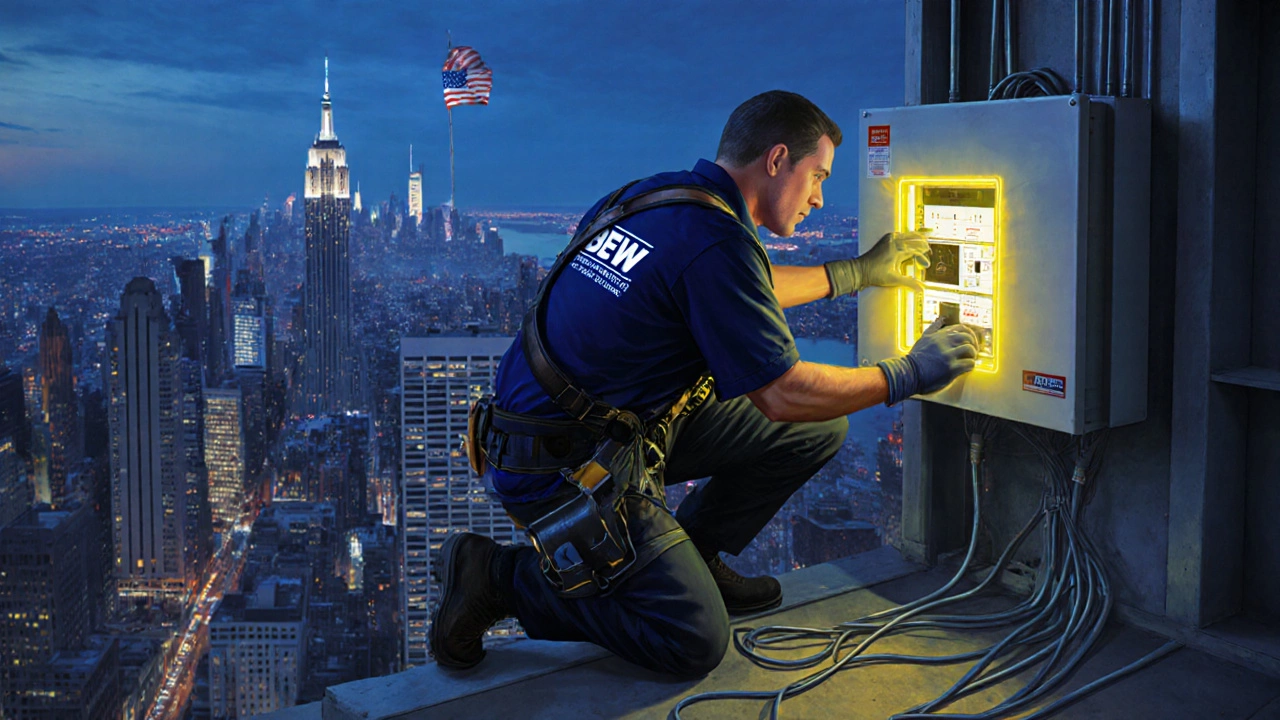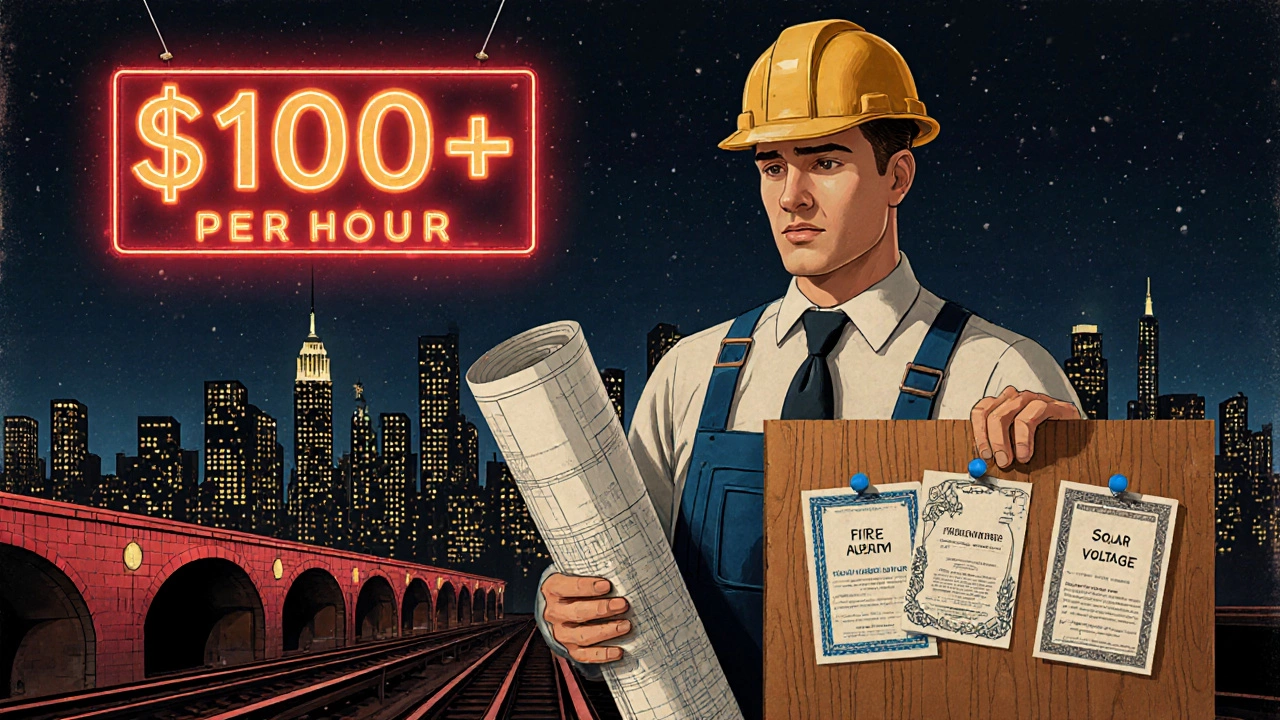NYC Electrician Hourly Pay Calculator
Calculate Your NYC Electrician Pay
Key Takeaways
- Entry‑level NYC electricians typically earn $35‑$45-$55 per hour.
- Journeyman electricians see $55‑$75-$90 per hour, while master‑level or union journeymen can reach $100-$130 per hour.
- Union membership, a valid NYC license, and specialized certifications (e.g., fire‑alarm, low‑voltage) boost hourly rates by 15‑30%.
- Apprenticeships (4‑5years) are the most common pathway; a NY State apprentice can start at $25‑$30 per hour.
- Higher cost of living in Manhattan, Brooklyn, and Queens means many electricians supplement income with overtime or side gigs.
Wondering how much electricians actually get paid by the hour in the heart of the Big Apple? The numbers aren’t one‑size‑fits‑all - they shift based on experience, union status, the type of work, and even the borough you’re working in. Below you’ll find a clear breakdown of hourly rates, the factors that push those rates up or down, and a step‑by‑step guide to landing a well‑paid electrician job in New York City.
Electrician is a skilled tradesperson who installs, maintains, and repairs electrical systems in residential, commercial, and industrial settings. In NYC, electricians must meet strict licensing requirements set by the state and the city, making the role both highly regulated and well compensated.
What Drives Hourly Pay for NYC Electricians?
The hourly wage you’ll see on a job posting isn’t random. It reflects a combination of measurable factors:
- Experience level: From apprentice to master electrician, each step brings a wage jump.
- Union vs. non‑union: The International Brotherhood of Electrical Workers (IBEW) Local 3 negotiates rates that are often 15‑30% higher than non‑union firms.
- Licensing and certifications: A City of New York Electrical License (often called a “Master Electrician License”) unlocks higher‑pay projects.
- Specialty work: Fire‑alarm systems, low‑voltage data cabling, and renewable‑energy installations command premium rates.
- Borough and project type: Manhattan commercial high‑rise jobs typically pay more than residential work in the outer boroughs.
- Overtime and shift differentials: Night or weekend work adds 1.5× or 2× the base rate.
Current NYC Electrician Hourly Rates (2025)
Below is a snapshot of the most recent data compiled from the NY Department of Labor, union contracts, and industry surveys. All figures are hourly base rates before overtime.
| Experience Level | Non‑Union Rate | Union Rate (IBEW Local3) |
|---|---|---|
| Apprentice (Year1‑2) | $25-$30 | $30-$35 |
| Apprentice (Year3‑5) | $30-$40 | $40-$48 |
| Journeyman (licensed) | $55-$75 | $70-$95 |
| Master Electrician (NYC license) | $90-$120 | $110-$140 |
| Specialist (fire‑alarm, low‑voltage) | $80-$105 | $100-$130 |
Note: Overtime can raise these numbers dramatically. A journeyman working a 12‑hour night shift could pull $150-$180 per hour when shift differentials apply.

How to Become a Licensed Electrician in NYC
If you’re eyeing those high‑pay rates, you’ll need to follow a proven pathway. Here’s a straightforward roadmap:
- Earn a high‑school diploma or GED. Math and physics classes give you a solid foundation.
- Enroll in an approved apprenticeship. Options include NY State’s Electrical Apprenticeship Program (partnered with IBEW Local3) or a community‑college pre‑apprenticeship.
- Complete on‑the‑job training. A typical apprenticeship lasts 4‑5years, mixing 8,000+ hours of hands‑on work with classroom instruction.
- Pass the State and City licensing exams. The New York State Department of Labor administers the “Electrical Construction Craftsperson” exam; the NYC Department of Buildings issues the final city license.
- Consider additional certifications. EMT fire‑alarm, fiber‑optic, or solar‑panel courses boost hourly rates by 10‑25%.
Many apprentices start at $25‑$30 per hour, but the wage scales as you log hours and pass exams. Once you earn your journeyman license, you can command the rates shown in the table above.
Cost‑of‑Living Adjustment: Why NYC Pays More
NYC’s average rent sits above $3,200 for a one‑bedroom in Manhattan (2025). That pressure pushes employers to offer higher wages to attract skilled workers. Compared to the national average electrician hourly rate of $45‑$55, NYC’s base is roughly 40‑60% higher.
However, higher wages don’t automatically translate to more disposable income. After taxes, transportation, and housing, many electricians still rely on overtime or side gigs (e.g., residential rewiring, freelance lighting design) to make ends meet.
Negotiating a Better Hourly Rate
Even with a solid license, you can still improve your hourly pay:
- Leverage union membership. IBEW Local3’s contract includes a clear step‑up schedule; ask your employer if they’re open to a union agreement.
- Show specialty certifications. A recent survey showed electricians with fire‑alarm or data‑cabling certs earned 12% more on average.
- Highlight overtime availability. Employers value workers who can fill night‑shift gaps; propose a shift‑differential clause.
- Document completed projects. A portfolio of high‑rise commercial jobs proves you can handle premium work.

Common Pitfalls That Hurt Pay
Even experienced electricians can fall into traps that drag wages down:
- Working without a proper NYC license - illegal work pays less and carries hefty fines.
- Skipping union membership - non‑union firms often offer lower base rates.
- Refusing overtime or night‑shift work - many high‑pay opportunities come with those schedules.
- Neglecting continuing education - codes evolve; outdated knowledge can disqualify you from premium projects.
Quick Reference Cheat Sheet
- Entry‑level (ApprenticeYear1‑2): $25‑$30/hr (non‑union), $30‑$35/hr (union)
- Journeyman (licensed): $55‑$75/hr (non‑union), $70‑$95/hr (union)
- Master Electrician (NYC license): $90‑$120/hr (non‑union), $110‑$140/hr (union)
- Specialist (fire‑alarm, low‑voltage): $80‑$105/hr (non‑union), $100‑$130/hr (union)
Frequently Asked Questions
What is the minimum hourly wage for a licensed electrician in NYC?
A journeyman with a New York State electrical license typically starts around $55 per hour for non‑union work and $70 per hour under the IBEW Local3 collective bargaining agreement.
How long does an apprenticeship take in New York City?
Most NYC electrical apprenticeships last 4 to 5years, combining roughly 8,000 on‑the‑job hours with classroom instruction.
Does being a union electrician significantly raise hourly pay?
Yes. Union contracts typically add 15‑30% to the base rate and include benefits like health insurance and retirement plans.
What extra certifications boost pay the most?
Fire‑alarm, low‑voltage data, and solar‑panel installer certifications are the top earners, often raising hourly rates by 10‑25%.
How does overtime affect average earnings?
Overtime is paid at 1.5× the regular rate (or 2× for double‑time). A journeyman earning $70/hr can make $105/hr on a 12‑hour night shift, dramatically increasing yearly take‑home pay.
Bottom line: if you’re willing to invest the time in a solid apprenticeship, acquire a NYC license, and consider joining IBEW Local3, you can earn well above $100 per hour on premium projects. The city’s high cost of living does push wages up, but the real profit comes from overtime, specialty certifications, and smart negotiation.
Ready to start the journey? Look up the NYC Department of Buildings apprenticeship listings, enroll in a community‑college electrical program, and begin logging those hours. Your future hourly wage could be just a few years away.





Write a comment